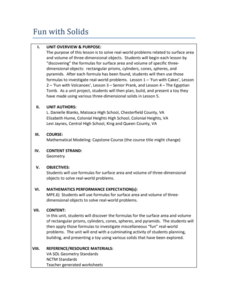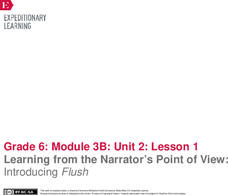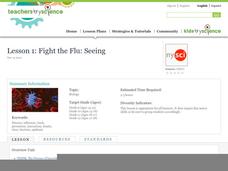Radford University
Danger! – An Analysis of the Death Toll of Natural Disasters
Decipher the danger of natural disasters. Using researched data, scholars work in groups to create data displays on the number of deaths from different types of natural disasters. They share their graphical representations with the class...
Radford University
Real World Data
Make math class feel more real by using real-world data. Scholars research or collect data on several different topics, such as nutrition, the motion of moving objects, cooling curves, and daylight hours. They create scatter plots using...
Radford University
Fun with Solids
Cakes offer a yummy way to learn about math. Scholars use manipulatives to discover the formulas for the surface area and volume of prisms and cylinders. They use their formulas to calculate the amount of cake mix and frosting necessary...
Radford University
Trouble in the Orchard
It's no fun catching a fungus. Scholars first investigate how the seasons affect the angle of the sun and the lengths of shadows. They then apply right triangle trigonometry to determine the height of trees based on their shadows to...
Radford University
Regression Analysis Activity
Don't let your knowledge of regression analysis regress. Pupils take part in three activities to learn about regression curves. They research and collect data to predict how long it will take a basketball to hit the ground, find a...
Radford University
Geyser Graphical Activity
Thar she blows! An engaging activity teaches pupils about geysers. They first read information about the Strokkur geyser in Iceland and analyze data on its eruptions by creating multiple data representations. Once finished, they research...
Children’s Hospital of Philadelphia
Understanding How Diseases Spread
To boost disease prevention, high schoolers arm themselves with information about infectious diseases and how they spread. Scholars research the causes, prevention techniques, and identify high-risk groups especially vulnerable to a...
EngageNY
Tracing the Idea of Fish Depletion: Chapter 1
Would you, could you? Scholars read World without Fish and focus carefully on the use of the words could and would. They chunk the text into smaller sections and write annotations on sticky notes to help with comprehension. To finish,...
EngageNY
Reading for Gist and Answering Text-Dependent Questions: Chapter 4 of World without Fish
True or false? Scholars read chapter four of World without Fish and explore the idea of a myth. They discuss in triads the meaning of the myth of nature’s bounty. Learners annotate the text on sticky notes and then answer text-dependent...
Children’s Hospital of Philadelphia
The Innate Immune System
My body is my castle. Pupils learn about the innate immune system in the second lesson plan of a three-part unit on the immune system by comparing the innate immune system to a castle and moat. Groups conduct a simulation where they try...
Children’s Hospital of Philadelphia
Development of Disease and Infection
It's all in the cards. Using cards to simulate a disease's attack on the immune system, pupils develop an understanding of how the immune system and pathogens react to each other and why at times the pathogen wins. Groups play a game to...
Children’s Hospital of Philadelphia
Animal Research and Vaccines
Animals save lives. In small groups pupils research the role of animals in the development of vaccines. Each team investigates one disease to find out how the vaccine was developed and how animals played a role n the research. Groups...
EngageNY
Introduction: The Ideas of Charles Darwin
Piece by piece ... Scholars read the text World without Fish by breaking the text into pieces. They identify challenging words and determine the gist of each section as they read. They then work together in triads to answer...
EngageNY
Learning from the Narrator’s Point of View: Introducing Flush
It is all down the drain. Scholars read chapter one of Flush and write any unfamiliar words in their word catchers and identify the narrator and point of view of the story. Pupils complete a point of view anchor chart and use Thought,...
EngageNY
Comparing an Author’s Presentation of Ideas: “Rachel Carson: Sounding the Alarm on Pollution”
It's all in the presentation. Readers take a look at author's presentation in the article Rachel Carson: Sounding the Alarm on Pollution. Scholars work together to complete a Comparing
and Contrasting Authors’ Presentation graphic...
EngageNY
Paraphrasing Quotes and Analyzing Visual Elements, Part 2: Investigating the Scientific Method with Max Axiom Super Scientist
Solve the world's problems. Class members move on to section two of Investigating the Scientific Methods with Max Axiom Super Scientist and complete a similar activity as in the previous lesson. Next, they carry out a first read to...
Mascil Project
Design and Build Your Own Vacuum Cleaner, Hair Dryer or Toy Car
No vacuum cleaner? No problem, just build your own. Scholars apply knowledge of currents to build a model of either a vacuum clear, a hair dryer, or a toy car. While the class completes the activity, instructors consider gender...
Curated OER
Compare and Contrast Night to Life is Beautiful
After reading Elie Wiesel's Night, watching the movie Life is Beautiful, and researching World War II, class members write a comparison essay on the book and film. This includes a prior knowledge activity, discussion in whole and small...
Workforce Solutions
Simple Machine Scavenger Hunt
How are simple machines used in professional settings? To find out, scholars examine various pictures, cross-reference a list of simple machines, and write or verbally share how those items are used in specific jobs.
Curated OER
Lesson 1: Fight the Flu: Seeing
The flu has been a deadly epidemic many times in the past. By examining technological innovations throughout history, then simulating the spread of disease from person to person through a classroom investigation, and finishing up with...
Curated OER
The Causes and Course of the First World War
Use this twelve-day lesson plan to teach about the causes and courses of WWI. Each day scholars attend lectures, complete creative activities, and hold round table discussions on what they've learned. Web links and resources are...
Curated OER
The Gay '80s, '90s and '00s
After reading and discussing a news article from the New York Times regarding gay and lesbian issues of the last thirty years, students engage in several activities to explore current events. They create a timeline, either electronically...
BioEd Online
Arm Model
Arm your young scientists with knowledge about anatomy as they build their own model of the elbow joint. Help them get a firm grasp on how muscles and bones interact to allow movement as they try different positions for the muscles on...
BioEd Online
Center of Gravity
Between the pull of gravity and the push of air pressure, it's a wonder animals can balance or move at all. With a hands-on lesson about the center of gravity, learners discuss their own experiences with the topic, then work with...

























